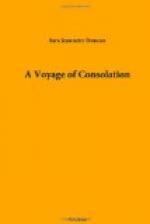“Then why do you go away?”
“Our time is so limited.”
“Ah, Mees Wick, you have all of your life.” The Italians certainly have exquisite voices.
“That is true,” I said thoughtfully.
“Many young American ladies now live always in Italy,” pursued Count Filgiatti.
“Is that so?” I replied pleasantly. “They are domiciled here with their parents?”
“Y—yes. Sometimes it is like that. And sometimes——”
“Sometimes they are working in the studios. I know. A delightful life it must be.”
The Count looked at the carpet. “Ah, signorina, you misunderstand my poor English,” he said; “she means quite different.”
It was not coquetry which induced me to cast down my eyes.
“The American young lady will sometimes contract alliance.”
“Oh!” I exclaimed.
“Yes. And if it is a good arrangimento it is always quite quite happy.”
“We are said,” I observed thoughtfully, “to be able, as a people, to accommodate ourselves to circumstances.”
“You approve this idea! Signorina, you are so amiable, it is heavenly.”
“I see no objection to it,” I said. “It is entirely a matter of taste.”
“And the American ladies have much taste,” observed Count Filgiatti blandly.
“I’m afraid it isn’t infallible,” I said, “but it is charming to hear it approved.”
“The American lady comes in Italy. She is young, beautiful, with a grace—ah! And perhaps there is a little income—a few dollar—but we do not speak of that—it is a trifle, only to make possible the arrangimento.”
“I see,” I said.
“The American lady is so perceiving—it is also a charm. The Italian gentleman has a dignity of his. He is perhaps from a family a little old. It is nothing—the matter is of the heart—but it makes possible the arrangimento.”
“I have read of such things before,” I said, “in the newspapers. It is most amusing to hear them corroborated on the spot. But that is one of the charms of travel, Count Filgiatti.”
The Count hesitated and a shade of indecision crossed his swarthy little features. Then he added simply, “For me she has always been a vision, that American lady. It is for this that I study the English. I have thought, ’When I meet one of those so charming Americans, I will do my possible.’”
I could not help thinking of that family of eleven and the father with the saints. It was pathetic to feel one’s self a realised vision without any capacity for beneficence—worse in some respects than being obliged to be unkind to hopes with no financial basis. It made one feel somehow so mercenary. But before I could think of anything to say—it was such a difficult juncture—the Count went on.
“But in the Italian idea it is better first one thing to know—the agreement of the American signorina. If she will not, the Italian nobleman is too much disgrace. It is not good to offer the name and the title if the lady say no, I do not want—take that poor thing away.”




